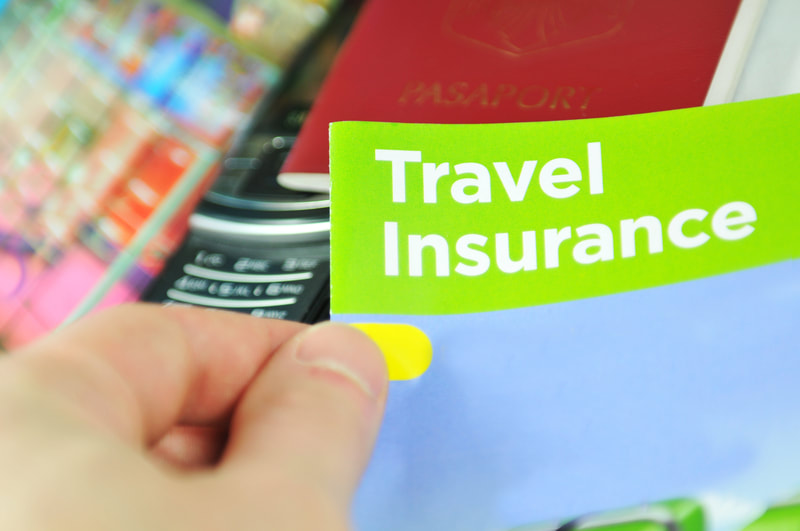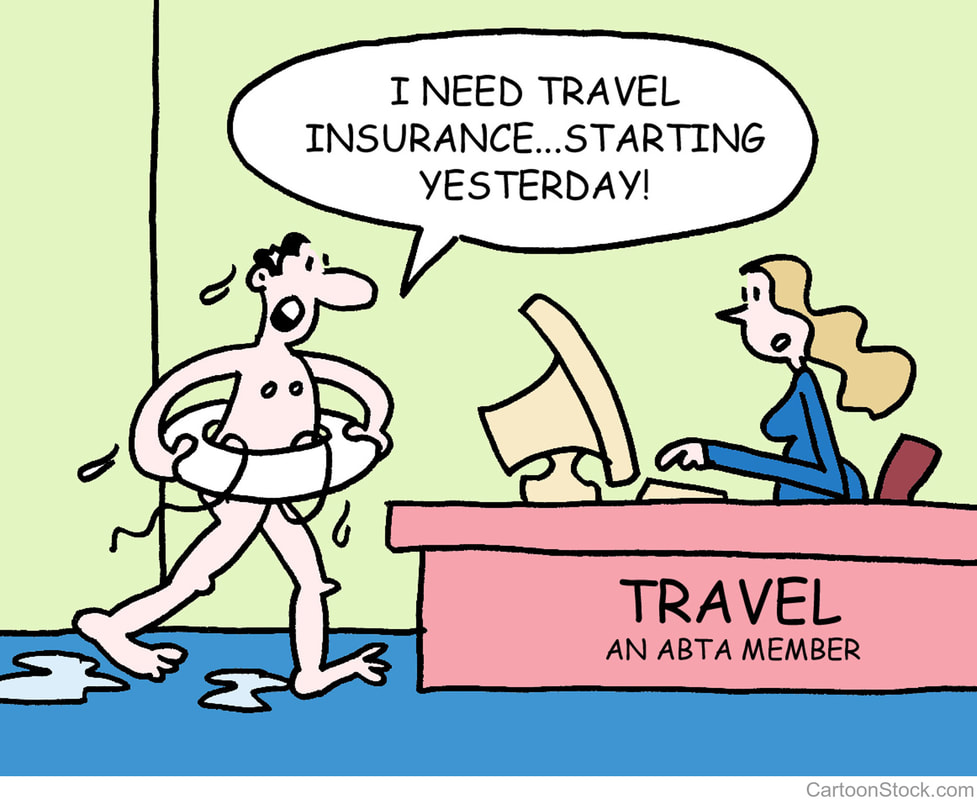Planning an international trip is always a whirlwind. You need to find flights, accommodations, research what you want to do abroad, and create a travel itinerary, of sorts.
Then, the dreaded question tends to come up, either in conversation with a travel agent or a little voice creeps into your head and says, "Do you need travel insurance?"
Based on a 2013 survey commissioned by Princeton Survey Research, roughly 20% of respondents bought travel insurance that year, leaving the remainder of respondents vulnerable to illness, accidents, and theft. This trend flipped a couple of years later after the Paris Attacks and Zika Virus, where some companies found an almost 80% increase in travel insurance, based off an article from Travel Insurance. This is a great representation of the awareness of travel insurance and how happenings across the globe can change the worldview on its importance.
Many people may still shrug their shoulders, trying to convince themselves that they are healthy, the likelihood of an emergency is slim-to-none, and that travel insurance is not worth the investment.
Tell that to the individual who broke his leg in two places, only being able to return home after an almost $3,000 medical bill; thanks, for the most part, to his previously purchased travel insurance. More so, try and explain that to the woman who developed a fever in Vietnam, only to have her main advocate for her health be her travel insurance agent.
While the investment seems like money that could have gone towards something more enjoyable, the moment you become ill overseas, break your ankle or lose thousands in luggage, you may wish you had purchased travel insurance.
Then, the dreaded question tends to come up, either in conversation with a travel agent or a little voice creeps into your head and says, "Do you need travel insurance?"
Based on a 2013 survey commissioned by Princeton Survey Research, roughly 20% of respondents bought travel insurance that year, leaving the remainder of respondents vulnerable to illness, accidents, and theft. This trend flipped a couple of years later after the Paris Attacks and Zika Virus, where some companies found an almost 80% increase in travel insurance, based off an article from Travel Insurance. This is a great representation of the awareness of travel insurance and how happenings across the globe can change the worldview on its importance.
Many people may still shrug their shoulders, trying to convince themselves that they are healthy, the likelihood of an emergency is slim-to-none, and that travel insurance is not worth the investment.
Tell that to the individual who broke his leg in two places, only being able to return home after an almost $3,000 medical bill; thanks, for the most part, to his previously purchased travel insurance. More so, try and explain that to the woman who developed a fever in Vietnam, only to have her main advocate for her health be her travel insurance agent.
While the investment seems like money that could have gone towards something more enjoyable, the moment you become ill overseas, break your ankle or lose thousands in luggage, you may wish you had purchased travel insurance.
When buying travel insurance, there are two aspects to consider. One is protecting your trip investment--i.e. travel expenses, luggage costs, and incidentals. The other is medical assistance while traveling abroad, in case you become ill or injured. Below are the steps to purchase travel insurance and keep yourself and your belongings safe:
Steps involved in purchasing travel insurance:
1. Check with your credit card companies
You will want to see if they will cover international travel, including medical coverage, because only a few do. Also, check with your own insurance company, including Medicare, to see if it covers international travel. Medicare coverage internationally is limited, and it will probably be wise to get primary medical coverage for international travel.
2. Get multiple quotes from your travel agent
Ask your travel agent to send you at least two quotes from different reputable travel insurance agencies so that you can compare costs and benefits. Without any cost comparison, you may end up paying more than you have to for travel insurance, based on your needs. This will also help you understand the logistics of different travel insurances and knowing what you will need and what may be costing you extra without reason.
3. Do not simply accept the suggested insurance policy from an airline, cruise line or tour company.
Many times it will cost you more and offer less coverage or benefits. However, do compare their policy with the other quotes you have received to get a well-rounded idea of insurance costs. Sometimes, especially when purchasing insurance as a group or for elderly travelers, the supplier’s policy can be less. One thing the supplier’s insurance doesn’t always cover is protection against bankruptcy by a tour/cruise operator or airline, something that can and does happen.
4. Work with a travel agent you trust
If you have found a good travel agent, she can point out the major differences in the travel insurance plans to help you decide. Any specific insurance questions should be addressed to the insurance company itself. Should your travel involve high-risk sports or activity, be sure to check the exclusions and limitations on your travel policy as well.
5. Learn when cut-off dates for certain travel benefits occur
Be sure to know when the cut off dates are to get the most benefits with your travel insurance--as far as coverage for pre-existing conditions and cancel for any reason clauses with the insurance company. Most insurance companies have a purchase by 14 days or 21 days from the date of deposit to be eligible for these benefits. If you are going to buy travel insurance, you may as well get all the benefits accessible to you, so know the deadlines.
6. Enjoy your trip, worry free
Once purchased, sit back and know that you have prepared well for your travel in case of unexpected or undesirable circumstances. Others may lament, regret, and lose out on their investment, but you will not. Should your trip go without incident and you have no need for an insurance claim, the peace of mind is worth something. Plus, many insurance companies have 24/7 concierge services and travel assistance you could engage if you need them.
Why you should always opt in for travel insurance:
A travel agent can help you fix a lot of different problems while you are traveling, but she cannot do much in the case of a medical need or emergency evacuation. This is where travel insurance is vital. Foregoing any travel insurance simply puts yourself and your money at risk, something you do not need looming in the back of your mind when you should be relaxing.
A quick quote given by Travel Insured can give an idea of just how little you will need to pay for insurance. A 50 year old, going on an eight day trip at a cost of $3,000 should expect to pay $109 to $216 roughly, based on a quote, and depending on the coverage. In comparison, a hospital bill can put you out thousands of dollars.
Purchasing travel insurance is not a mistake. Having even just a basic plan is better than nothing at all. Free tip: If you will be traveling abroad at least twice in one year, take a look at some of the yearly insurance plans. You might find yearly insurance will be less money in the long run.
For those interested in booking river cruises or hosted tours, please visit Wonderful Trips to learn more - let them help you plan your next wonderful trip. They will help you find answers to your travel insurance questions as well.
Co-written by: Linda Teekell - Owner of Wonderful Trips & Sarah DeGeorge - Guest Writer for Wonderful Trips
Steps involved in purchasing travel insurance:
1. Check with your credit card companies
You will want to see if they will cover international travel, including medical coverage, because only a few do. Also, check with your own insurance company, including Medicare, to see if it covers international travel. Medicare coverage internationally is limited, and it will probably be wise to get primary medical coverage for international travel.
2. Get multiple quotes from your travel agent
Ask your travel agent to send you at least two quotes from different reputable travel insurance agencies so that you can compare costs and benefits. Without any cost comparison, you may end up paying more than you have to for travel insurance, based on your needs. This will also help you understand the logistics of different travel insurances and knowing what you will need and what may be costing you extra without reason.
3. Do not simply accept the suggested insurance policy from an airline, cruise line or tour company.
Many times it will cost you more and offer less coverage or benefits. However, do compare their policy with the other quotes you have received to get a well-rounded idea of insurance costs. Sometimes, especially when purchasing insurance as a group or for elderly travelers, the supplier’s policy can be less. One thing the supplier’s insurance doesn’t always cover is protection against bankruptcy by a tour/cruise operator or airline, something that can and does happen.
4. Work with a travel agent you trust
If you have found a good travel agent, she can point out the major differences in the travel insurance plans to help you decide. Any specific insurance questions should be addressed to the insurance company itself. Should your travel involve high-risk sports or activity, be sure to check the exclusions and limitations on your travel policy as well.
5. Learn when cut-off dates for certain travel benefits occur
Be sure to know when the cut off dates are to get the most benefits with your travel insurance--as far as coverage for pre-existing conditions and cancel for any reason clauses with the insurance company. Most insurance companies have a purchase by 14 days or 21 days from the date of deposit to be eligible for these benefits. If you are going to buy travel insurance, you may as well get all the benefits accessible to you, so know the deadlines.
6. Enjoy your trip, worry free
Once purchased, sit back and know that you have prepared well for your travel in case of unexpected or undesirable circumstances. Others may lament, regret, and lose out on their investment, but you will not. Should your trip go without incident and you have no need for an insurance claim, the peace of mind is worth something. Plus, many insurance companies have 24/7 concierge services and travel assistance you could engage if you need them.
Why you should always opt in for travel insurance:
A travel agent can help you fix a lot of different problems while you are traveling, but she cannot do much in the case of a medical need or emergency evacuation. This is where travel insurance is vital. Foregoing any travel insurance simply puts yourself and your money at risk, something you do not need looming in the back of your mind when you should be relaxing.
A quick quote given by Travel Insured can give an idea of just how little you will need to pay for insurance. A 50 year old, going on an eight day trip at a cost of $3,000 should expect to pay $109 to $216 roughly, based on a quote, and depending on the coverage. In comparison, a hospital bill can put you out thousands of dollars.
Purchasing travel insurance is not a mistake. Having even just a basic plan is better than nothing at all. Free tip: If you will be traveling abroad at least twice in one year, take a look at some of the yearly insurance plans. You might find yearly insurance will be less money in the long run.
For those interested in booking river cruises or hosted tours, please visit Wonderful Trips to learn more - let them help you plan your next wonderful trip. They will help you find answers to your travel insurance questions as well.
Co-written by: Linda Teekell - Owner of Wonderful Trips & Sarah DeGeorge - Guest Writer for Wonderful Trips



 RSS Feed
RSS Feed